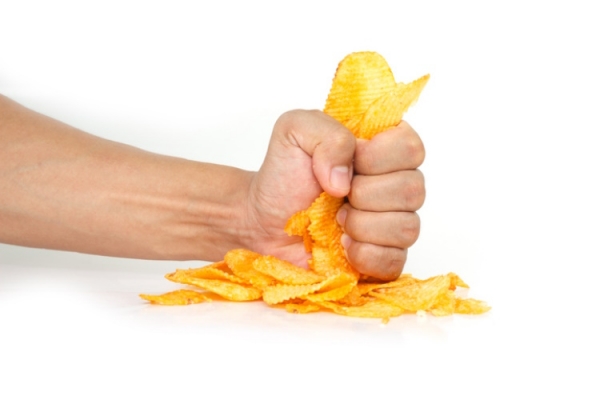
[ad_1]
With Schubert’s Ave Maria enjoying within the background, the 30-second spot by Amica Chips is ready in a convent with a gaggle of nuns strolling to Mass to obtain holy communion.
It switches to the mom superior, who finds an empty tabernacle – the vessel through which the Eucharist (the consecrated communion hosts) is saved – and in a quick-thinking transfer, fills it with a number of the potato chips she has at hand.
The pray of younger nuns delight within the noisy substitution, as does the abbess in ending off the pack from the confessional.
The spot – which was aired on Mediaset, Italy’s largest industrial broadcaster, together with different personal networks – ends with the tagline, ‘Il divino quotidiano’ (The divine on a regular basis).
Artistic company Lorenzo Marini Group informed the Guardian the advert was meant to convey a ‘sturdy British irony’. It’s aimed on the youthful market and intentionally exaggerates ‘the irresistible crunchiness of Amica Chips’.
Whereas supposedly a light-hearted tackle snacking, it’s sparked anger in Italy.
Giovanni Baggio, president of AIART (the Italian Affiliation of Radio and Tv Listeners) known as for its rapid suspension. He branded the spot as sacrilegious and famous it “offends the sensitivity of hundreds of thousands of working towards Catholics by trivializing the comparability between the potato chip and the consecrated object.”
Catholics consider the communion wafer represents the physique and blood of Christ.
Catholic newspaper Avvenire additionally criticized the advert, stating, “Christ has been lowered to a potato chip. Debased and vilified like 2,000 years in the past.”
Likewise, the horror and resentment spilled onto social media, with quite a few customers suggesting to boycott of Amica.
Lesson for the advertising and marketing group
It’s comprehensible why some would possibly discover the idea controversial, with such campaigns blurring the road between what’s thought-about applicable and what’s deemed as offensive, particularly on the subject of spiritual practices. On this case, using the communion ceremony is taken into account crossing the boundary.
It’s an vital reminder of the necessity to contemplate cultural consciousness in advertising and marketing campaigns, particularly in various societies like Italy.
Braggio slams the advert for its lack of creativity, claiming it’s “an indication of an incapacity to do advertising and marketing with out resorting to symbols that don’t have anything to do with consumption and crunchy meals.”
He has appealed to advertising and marketing creatives “to be extra respectful of cultural and non secular identities and to work for commercials which might be inclusive and that attraction to all customers in a approach that’s cautious to not create discomfort and disapproval.”
“Allow us to work collectively for a civilization that should develop in respect for cultural and non secular identities,” he mentioned.
On its web site, AIART mentioned it had discovered that IAP, Italy’s promoting requirements authority, had “upheld our attraction for the rapid suspension of the industrial. We categorical satisfaction and can proceed to observe the safety of media residents.”
Amica Chips has not responded to requests for remark.
Amica Chips SpA was based in 1990 by Alfredo Moratti and Andrea Romanò in Castiglione delle Stiviere, the place it nonetheless has its headquarters. Inside a yr, the snack producer had turn into the official provider for one of many nation’s largest retail teams, Essenlunga, prompting a a lot bigger growth program, together with the acquisition of native rival Dorita in 1996, adopted by Milan-based snacks, croutons and corn flakes producer Pandal in 1998 and and Triveneto-based Mia in 2004.
Right now, the corporate is a frontrunner in Italy’s potato chips market, bringing in an annual turnover in extra of €89m from gross sales in additional than 20 international locations across the globe.
A number of the adverts to have sparked debate
Whereas not commonplace, the potato chip sector will not be utterly with out its advertising and marketing controversies.
Lay’s 2010 ‘Crunch all you need. We’ll make extra’ marketing campaign was not inherently controversial; nonetheless, it was tarred as a derogatory reference of American greed and consumerism. The marketing campaign drew criticism from environmental teams for selling overconsumption and wastefulness, given the environmental influence of potato chip manufacturing and packaging.
In 2016, Doritos’ Tremendous Bowl industrial depicted a pregnant girl getting an ultrasound whereas her associate ate Doritos. It sparked debate over whether or not it was inappropriate or humorous, with some viewers discovering it distasteful or offensive.
In 2017, Pringles launched a spot within the UK that includes individuals utilizing a ‘starvation hammer’ to fulfill their snack cravings, which obtained criticism for its portrayal of binge consuming and selling unhealthy consuming habits.
In 2018, Kettle Chips aired a industrial throughout a Comedy Central roast that made gentle of actor Rob Lowe’s former struggles with habit. It obtained rapid backlash for exploiting somebody’s private struggles for comedic impact.
Additionally in 2018, Doritos ‘Woman Doritos’ had the web in a really vocal uproar. On a podcast interview, PepsiCo’s then CEO Indra Nooyi talked concerning the growth of a model of female-friendly Doritos that will be much less messy and quieter to eat.
Stated Nooyi, “as you watch a whole lot of the younger guys eat the chips, they love their Doritos and so they lick their fingers with nice glee, and once they attain the underside of the bag they pour the little damaged items into their mouth… Ladies would like to do the identical, however they don’t. They don’t wish to crunch too loudly in public. And so they don’t lick their fingers generously and so they don’t wish to pour the little damaged items and the flavour into their mouth.”
The thought was broadly criticized for perpetuating gender stereotypes.
Earlier this yr, Doritos severed ties with a transgender activist Samantha Hudson over outdated tweets, together with one the place she wrote about doing ‘wicked issues’ to a 12-year-old. Doritos Spain had signed up Hudson to look in a 50-second video known as ‘Crunch Talks’.
[ad_2]

